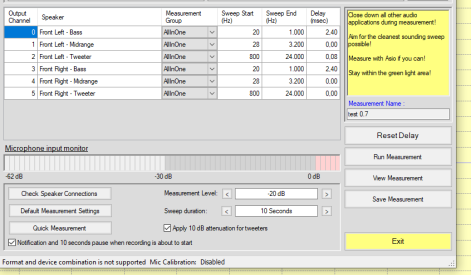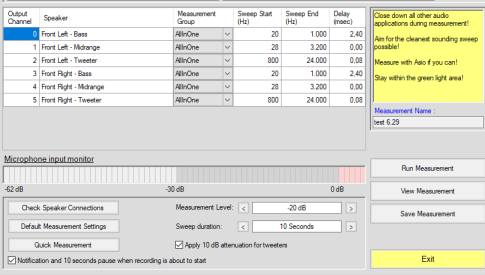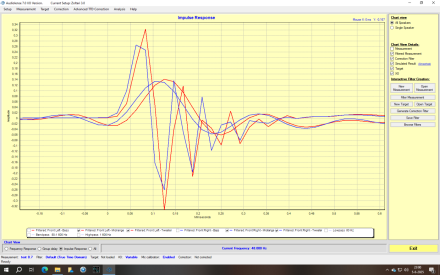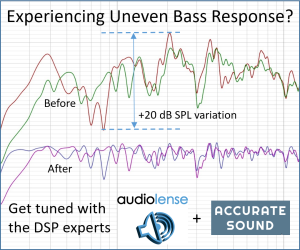-
AUDIO VIDEO PROCESSING, SETUP & ENVIRONMENTOfficial REW (Room EQ Wizard) Support Forum Audiolense User Forum Calibration Equipment Auto-EQ Platforms / Immersive Audio Codecs Video Display Technologies / Calibration AV System Setup and Support Listening Room / Home Theater Build Projects Room Acoustics and Treatments AV Showcase Movies / Music / TV / Streaming
-
AUDIO VIDEO DISCUSSION / EQUIPMENTHome Theater / Audio and Video - Misc Topics Essence For Hi Res Audio AV Equipment Advice and Pricing Awesome Deals and Budget AV Equipment AV Receivers / Processors / Amps UHD / Blu-ray / CD Players / Streaming Devices Two Channel Hi-Fi Equipment DIY Audio Projects Computer Systems - HTPC / Gaming HD and UHD Flat Screen Displays Projectors and Projection Screens AV Accessories Buy - Sell - Trade
Navigation
Install the app
How to install the app on iOS
Follow along with the video below to see how to install our site as a web app on your home screen.
Note: This feature may not be available in some browsers.
More options
You are using an out of date browser. It may not display this or other websites correctly.
You should upgrade or use an alternative browser.
You should upgrade or use an alternative browser.
New Audiolense releases
- Thread starter juicehifi
- Start date
Cornelis Huizinga
Member
- Joined
- Sep 3, 2017
- Posts
- 31
Today I started using version 0.7. First I aligned the microphone as best as possible. I measure with a Motu UltraLite mk5, so no hassle with 2 devices.
The first measurement of my active 3-way speakers was disappointing. The first screenshot shows that the right tweeter and midrange have no delay compared to each other. The left channel shows the delay as I am used to. To check, I also measured with version 6.29. That looks good.
I repeated the measurements a few times and reinstalled 7.0. No change. If I delete the al.ini file, it does show a delay in the right channel in the first measurement, but not as precise as with the 6.29 version. The following measurements then show 0 delay again.
I don't know if this is a bug, or just ignorance on my part. Hopefully someone knows a solution.
The first measurement of my active 3-way speakers was disappointing. The first screenshot shows that the right tweeter and midrange have no delay compared to each other. The left channel shows the delay as I am used to. To check, I also measured with version 6.29. That looks good.
I repeated the measurements a few times and reinstalled 7.0. No change. If I delete the al.ini file, it does show a delay in the right channel in the first measurement, but not as precise as with the 6.29 version. The following measurements then show 0 delay again.
I don't know if this is a bug, or just ignorance on my part. Hopefully someone knows a solution.
Attachments
Cornelis Huizinga
Member
- Joined
- Sep 3, 2017
- Posts
- 31
Hi Bernt,
Hopefully what I did is correct. First I filtered the measurement with the 7.0 version and then I zoomed in on the tweeter and midrange impulses on the filtered measurement. The result is visible on the enclosed screenshot. I hope this is useful to you.
Cornelis
Hopefully what I did is correct. First I filtered the measurement with the 7.0 version and then I zoomed in on the tweeter and midrange impulses on the filtered measurement. The result is visible on the enclosed screenshot. I hope this is useful to you.
Cornelis
Attachments
Cornelis Huizinga
Member
- Joined
- Sep 3, 2017
- Posts
- 31
In addition:
If I compare the measurement between version 6.29 and 7.0, the difference between right tweeter and midrange is at 7.0 (31ms) and 6.29 (127ms)
If I compare the measurement between version 6.29 and 7.0, the difference between right tweeter and midrange is at 7.0 (31ms) and 6.29 (127ms)
juicehifi
Audiolense
Thread Starter
- Joined
- Feb 5, 2018
- Posts
- 903
I think you should proceed with these measurements. I believe they are good. The first negative peak is interpreted as the peak of the midranges here, that's why the mids are interpreted to arrive earlier than the tweeters.
For a TTD correction the peak finding has no consequence unless you edit the timing manually. For a frequency correction there's a risk that the mids are interpreted as having negative polarity here. However, things may change after the crossover has been applied.
Anyway I recommend that you disable the automatic polarity correction from the measurement menu. When you have done that, you should enter the measurement module and change one of the delay values. This will make the "reset delay" button visible. So press that button, resave the measurement and send it to the main form.
I do not understand the milliseconds you mention in your most recent post. Your screen shots shows 0.08 ms delay for the 7.0 measurement...
For a TTD correction the peak finding has no consequence unless you edit the timing manually. For a frequency correction there's a risk that the mids are interpreted as having negative polarity here. However, things may change after the crossover has been applied.
Anyway I recommend that you disable the automatic polarity correction from the measurement menu. When you have done that, you should enter the measurement module and change one of the delay values. This will make the "reset delay" button visible. So press that button, resave the measurement and send it to the main form.
I do not understand the milliseconds you mention in your most recent post. Your screen shots shows 0.08 ms delay for the 7.0 measurement...
Cornelis Huizinga
Member
- Joined
- Sep 3, 2017
- Posts
- 31
Hi Bernt,
You were absolutely right. With the automatic polarity check disabled, the measurements for both 6.29 and 7.0 were identical. The tweeters are now set to a delay of 0 and the midwoofers to 0.05. Yesterday's measurements looked quite messy. I live next to a busy road and the attic where I measure is far from quiet. At night it is a lot better.
Once again, many thanks for your explanation.
Cornelis
You were absolutely right. With the automatic polarity check disabled, the measurements for both 6.29 and 7.0 were identical. The tweeters are now set to a delay of 0 and the midwoofers to 0.05. Yesterday's measurements looked quite messy. I live next to a busy road and the attic where I measure is far from quiet. At night it is a lot better.
Once again, many thanks for your explanation.
Cornelis
juicehifi
Audiolense
Thread Starter
- Joined
- Feb 5, 2018
- Posts
- 903
[20 june 2025] (beta)
Audiolense 7.1 (64 bit)
Audiolense 7.1 (32 bit)
Audiolense 7.1 (64 bit)
Audiolense 7.1 (32 bit)
- Speeded up additional processes with parallel processing.
- Fixed a bug where low pass was omitted on subwoofers if they were not also used to bass offloading.
juicehifi
Audiolense
Thread Starter
- Joined
- Feb 5, 2018
- Posts
- 903
[22 jun 2025]
Audiolense convolver 1.10.exe
Audiolense convolver 1.10.exe
- Fixed a few minor gui display issues.
- Implemented the improved resampler that has been in use in Audiolense for a while
- Implemented support for the revised AL correction format, needed to supppport very high channel count.
- This version is back-compatible with older corrections.
juicehifi
Audiolense
Thread Starter
- Joined
- Feb 5, 2018
- Posts
- 903
juicehifi
Audiolense
Thread Starter
- Joined
- Feb 5, 2018
- Posts
- 903
[27 june 2025]
Audiolense 7.2 (64 bit)
Audiolense 7.2 (32 bit)
Audiolense 7.2 (64 bit)
Audiolense 7.2 (32 bit)
- Brought back the measurement quality report on unsuccesful measurements
- Eliminated a minor bug in the measurement that could lead to unhandled exception.
- Fixed improper initialisation related to the speaker connection check.
- Ignored the first recorded buffer in the measurement because it’s a dummyu.
juicehifi
Audiolense
Thread Starter
- Joined
- Feb 5, 2018
- Posts
- 903
[22 aug 2025]
Audiolense 7.3 (64 bit)
Audiolense 7.3 (32 bit)
Audiolense 7.3 (64 bit)
Audiolense 7.3 (32 bit)
- Multi seat correction had not been properly prepared for multithreading, which has now been fixed.
- All tests look good, and the subject code has been investigated and modified to be thread safe. Nevertheless, for now, it is recommended to examine the simulated results and look for anomalies.
whoareyou
Member
- Joined
- Dec 23, 2021
- Posts
- 252
More
- Main Amp
- Benchmark AHB2
- Additional Amp
- ATI AT525NC
- DAC
- Exasound E38
- Computer Audio
- JRiver
- Front Speakers
- Psb synchrony one
- Center Channel Speaker
- PSB synchrony one C
- Surround Speakers
- Revel m105
The download is triggering a false positive in Microsoft Defender for virus Win32/Wacapew.C!ml[22 aug 2025]
Audiolense 7.3 (64 bit)
Audiolense 7.3 (32 bit)
- Multi seat correction had not been properly prepared for multithreading, which has now been fixed.
- All tests look good, and the subject code has been investigated and modified to be thread safe. Nevertheless, for now, it is recommended to examine the simulated results and look for anomalies.
Thinks it's making changes to settings without permission being granted
juicehifi
Audiolense
Thread Starter
- Joined
- Feb 5, 2018
- Posts
- 903
No, it's just because Windows Defender does a lot of its actions on name recognition. If something has been falsely flagged as potentially dangerous, it seems to be flagged more or less for every new release. And unfortunately, afaik, there's no way for me to pre-empt this flag unless I get a security certificate (which I intend to do eventually, but not right now). There has been a number of warnings and blocks throughout the years, but there has never been any virus involved.The download is triggering a false positive in Microsoft Defender for virus Win32/Wacapew.C!ml
Thinks it's making changes to settings without permission being granted
whoareyou
Member
- Joined
- Dec 23, 2021
- Posts
- 252
More
- Main Amp
- Benchmark AHB2
- Additional Amp
- ATI AT525NC
- DAC
- Exasound E38
- Computer Audio
- JRiver
- Front Speakers
- Psb synchrony one
- Center Channel Speaker
- PSB synchrony one C
- Surround Speakers
- Revel m105
I realize it's a false positive, and I suppose most who download AL know there is not really an issue, but this time Defender is sandboxing the "virus" so you have to tell defender to make an exception (instead of simply telling the browser to "keep anyway").No, it's just because Windows Defender does a lot of its actions on name recognition. If something has been falsely flagged as potentially dangerous, it seems to be flagged more or less for every new release. And unfortunately, afaik, there's no way for me to pre-empt this flag unless I get a security certificate (which I intend to do eventually, but not right now). There has been a number of warnings and blocks throughout the years, but there has never been any virus involved.
Leo11
Registered
- Joined
- Jul 23, 2022
- Posts
- 39
More
- Main Amp
- Hypex NC252MP
- Additional Amp
- Hypex NC502MP
- DAC
- Motu Ultralite Mk5
- Computer Audio
- Dell notebook
- Streaming Subscriptions
- Amazon Music Unlimited
- Front Speakers
- NHT C3
- Subwoofers
- 2x 12" DIY Scan Speak acoustic suspension
I just noticed that in release 6.24 there was this note:
A small rounding error on the peak finder was discovered, the fix may lead to improved alignments in some setups.
Does it refer to the changes made in 6.22?
A small rounding error on the peak finder was discovered, the fix may lead to improved alignments in some setups.
Does it refer to the changes made in 6.22?
juicehifi
Audiolense
Thread Starter
- Joined
- Feb 5, 2018
- Posts
- 903
In 6.24 the peak finder has new usage, related to resampling of filters. And it didn't work as intended with that usage. So I took a closer look at everything. And found a small rounding error. Mostly a minor technical improvement and far more important for the revised resampling than the original correction.
juicehifi
Audiolense
Thread Starter
- Joined
- Feb 5, 2018
- Posts
- 903
[31 oct 2025]
Audiolense 7.4 (64 bit)
Audiolense 7.4 (32 bit)
Low frequency extension and ringing prior to 7.4 below. Start frequencies were 5, 10, 20, 40 and 80 Hz. 3 second sweeps.

Same as above, but in 7.4: Increased low frequency extension, yet reduced driver low frequency execursion

Ringing in the measurement will usually not impact the measured result, since the range of the measurement typically have enveloped the range of the speaker and driver. But below 20 Hz the changes may make an improvement.
Audiolense 7.4 (64 bit)
Audiolense 7.4 (32 bit)
- Bug fixes and other code improvements after the release of 7.0, but also some improvements to the measurement process.
- Fixed bug related to manual channel selection in the measurement module. This appeared with v 7.0.
- The use of measurement groups wasn’t properly prepared for. This has now been fixed.
- Improved multithreading in the correction algorithms.
- Enabled the multi seat feature to function with parallel processing.
- Assuring more uniform fade in and fade out across sweep durations in the measurement module.
- Implemented a more controlled low frequency extension in the fade-in below the start frequency of the sweep.
- Implemented a “low frequency extension” correction that gives truer low frequency response below start frequency of the sweep.
- The combined result is lower frequency extension measured while driver execution has been reduced.
- The same changes also leads to less low frequency ringing in the measurement at very low frequencies.
- Note: The progress bar may give a false impression that the code hangs when the correction is created.
Low frequency extension and ringing prior to 7.4 below. Start frequencies were 5, 10, 20, 40 and 80 Hz. 3 second sweeps.
Same as above, but in 7.4: Increased low frequency extension, yet reduced driver low frequency execursion
Ringing in the measurement will usually not impact the measured result, since the range of the measurement typically have enveloped the range of the speaker and driver. But below 20 Hz the changes may make an improvement.
juicehifi
Audiolense
Thread Starter
- Joined
- Feb 5, 2018
- Posts
- 903
If you have significant bass extension below 20 Hz. And/or you’re always trying to improve things you should absolutely try this.
And if you have experienced significant measurement problems, you should absolutely try it.
But if you’re like me … just keep enjoying
And if you have experienced significant measurement problems, you should absolutely try it.
But if you’re like me … just keep enjoying
whoareyou
Member
- Joined
- Dec 23, 2021
- Posts
- 252
More
- Main Amp
- Benchmark AHB2
- Additional Amp
- ATI AT525NC
- DAC
- Exasound E38
- Computer Audio
- JRiver
- Front Speakers
- Psb synchrony one
- Center Channel Speaker
- PSB synchrony one C
- Surround Speakers
- Revel m105
Hi Bernt,
@juicehifi - In 7.3 I used a custom configuration with one extra channel for second subwoofer. When I used 7.4 to take measurement with this setup configuration, the measurement process thought there were 14 channels instead of the proper number of 13 (7.2.4). Seemed to screw up the measurement.
I recreated setup with new 7.4 version and I'm pretty sure this has resolved the issue, but there was some incompatibility between versions and setup file.
.
No big deal as recreating the setup seems to have corrected the issue, but something to definitely be aware of.
Thanks
@juicehifi - In 7.3 I used a custom configuration with one extra channel for second subwoofer. When I used 7.4 to take measurement with this setup configuration, the measurement process thought there were 14 channels instead of the proper number of 13 (7.2.4). Seemed to screw up the measurement.
I recreated setup with new 7.4 version and I'm pretty sure this has resolved the issue, but there was some incompatibility between versions and setup file.
.
No big deal as recreating the setup seems to have corrected the issue, but something to definitely be aware of.
Thanks
whoareyou
Member
- Joined
- Dec 23, 2021
- Posts
- 252
More
- Main Amp
- Benchmark AHB2
- Additional Amp
- ATI AT525NC
- DAC
- Exasound E38
- Computer Audio
- JRiver
- Front Speakers
- Psb synchrony one
- Center Channel Speaker
- PSB synchrony one C
- Surround Speakers
- Revel m105
@juicehifi - One issue that I've run up against .. When creating a new speaker layout, initially a 2 channel layout is automatically created. After creating my desired 7.2.4 layout, and saving the new layout, I am unable to delete the default 2 channel layout. AL gives error message. Again, nothing too bad, but I would like to delete the unused layout so that when filters are created I don't end up with unused 2 channel cfg files that I need to remember to delete from my directories. Thanks
whoareyou
Member
- Joined
- Dec 23, 2021
- Posts
- 252
More
- Main Amp
- Benchmark AHB2
- Additional Amp
- ATI AT525NC
- DAC
- Exasound E38
- Computer Audio
- JRiver
- Front Speakers
- Psb synchrony one
- Center Channel Speaker
- PSB synchrony one C
- Surround Speakers
- Revel m105
Sorry. Playback format. Here I'm trying to delete the 2 channel format after adding 7.1.4 Atmos format.Layout or playback format?
Popular tags
20th century fox
4k blu-ray
4k uhd
4k ultrahd
action
adventure
animated
animation
bass
blu-ray
calibration
comedy
comics
denon
dirac
dirac live
disney
dolby atmos
drama
fantasy
hdmi 2.1
home theater
horror
kaleidescape
klipsch
lionsgate
marantz
movies
onkyo
paramount
pioneer
rew
romance
sci-fi
scream factory
shout factory
sony
stormaudio
subwoofer
svs
terror
thriller
uhd
ultrahd
ultrahd 4k
universal
value electronics
warner
warner brothers
well go usa


















